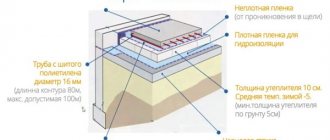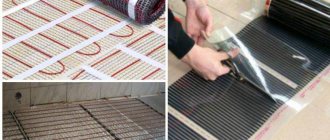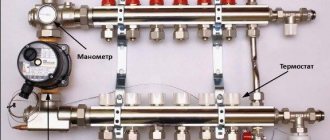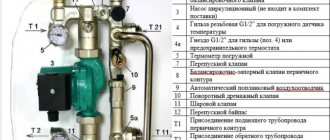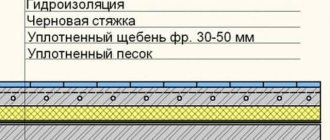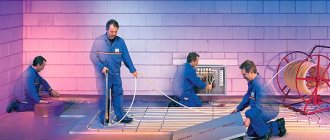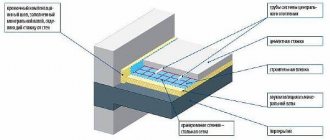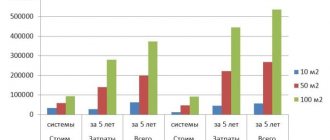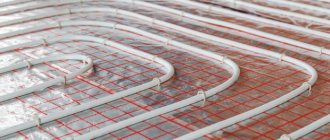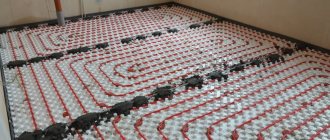When installing an internal heating system, the most important point is a high-quality screed, which in the future will become the basis for the finishing coating. The reliability and durability of the heating system will depend on its solidity and level of strength. For this reason, it is important what material will be used. If until recently a sand-cement mixture was used for this, now, thanks to the latest technologies, special components and additives have been developed.
So, the most effective component is a plasticizer for screeding a warm water floor, which makes it possible to create a holistic and strong base.
Is a plasticizer needed and its purpose?
A plasticizer is a component designed to make concrete for heated floors elastic and durable, while the surface is more even and smooth.
This substance improves the solubility of cement clinker, which helps attract particles to each other, pushing air and excess water towards each other, thereby making the mixture more elastic. It turns out to be more dense, which means it dries better, there is practically no shrinkage, and moisture does not penetrate into it.
In addition, the additive protects the concrete coating from deformation under the influence of heat, regardless of the type of heated floor: water, electric or infrared.
For your information! The plasticizer contains only components that are safe for human health, they are non-toxic, and do not have an unpleasant odor.
The main disadvantage of adding an additive to the solution for pouring heated floors is the increase in the cost of the structure, and a more complex installation process, since the mass needs to be in constant vibration.
Advantages and disadvantages of plasticizers
- Plasticizers include components that slow down corrosion, which has a beneficial effect on the reinforcing elements of the floor.
- The screed becomes strong, dense and acquires the effect of repelling water, and also neutralizes the possibility of the appearance of salt.
- The hardening time of concrete is significantly reduced.
- Increases the thermal conductivity coefficient of the concrete base by displacing air and water molecules (10-20% of the volume) from the concrete solution.
- Complies with all environmental standards. Without smell.
- Concrete becomes elastic and mobile, the pouring process is simplified, and the surface becomes almost smooth.
- Durability.
- It is possible to use a plasticizer as an antifreeze additive down to -25 degrees.
There are few disadvantages, but they do exist:
- No matter how strange it sounds, the composition is chemically complex.
- Compliance with instructions is required.
Properties and types
A plasticizer for cement mortar, intended for the construction of heated floors, has properties that have a positive effect on their quality.
The main properties of additives used in the manufacture of cement mortar for heated floors:
- repel liquid;
- withstands sub-zero temperatures down to -25°C;
- have a neutralizing effect on potassium nitrate in the amount of 5% of the total mass;
- protect the concrete base from the negative effects of chemicals;
- have inhibitory qualities;
- impart strength by reducing the surface tension of water;
- reduce the ability to crack.
It is important to correctly determine which type of plasticizer is suitable for the floor, because this affects both the service life of the heating system and your electrical energy costs.
When using a concrete mixture without a plasticizer, uneven heating of the surface and a decrease in thermal conductivity are possible, since there are air voids in the screed. It is better to add a plasticizer in the form of an emulsion, then the mixture will be more homogeneous.
By type of additive there are:
- liquid - they are easy to work with and there is no need for preparation;
- dry - stored for a long time, but require kneading;
- reinforcing - equipped with additional chemical elements that give strength to the screed;
- anti-frost - used for outdoor work.
Manufacturers and cost
When choosing a plasticizer for a solution, you should take into account its compatibility with heated floors. The cost of the screed additive also plays an important role.
Today there are many companies in the world that specialize in its production. Let's look at the main manufacturers.
Isomat Plastiproof
Isomat Plastiproof (Greece) is a waterproofing material with plasticizer properties. Improves the physical characteristics of concrete and reduces the level of water absorption.
Increases elasticity and prevents the formation of air voids in the solution. The composition does not contain chlorides or other substances that cause corrosion.
The use of Isomat Plastiproof makes it possible to create high-strength concrete that can be pumped. Compatible with any type of concrete. Available in cans from 5 to 20 kg, and in barrels of 240 kg. On average, the price of 5 kg costs 1200 rubles.
Sanpol
Sanpol is a country of origin: Ukraine. The substance is a mixture of liquid consistency, of excellent quality. Designed for screeding underfloor heating, as it can increase the strength and thermal conductivity of the structure. The use of this type of additive reduces water consumption by up to 15%.
The process of pouring screed is long and quite complex, which requires some experience. But its advantage is that Sanpol slows down the rate of setting of the mixture, this makes it possible to correct mistakes, especially suitable for those who are working with concrete for the first time.
For your information! The plasticizer for underfloor heating in concrete is taken at the following rate: 0.1 liter per 200 kg of cement. On average, the price in the aisles is 140 rubles per liter.
DEG-1
DEG-1 is an epoxy resin, belongs to the group of additives, used as a casting plasticizer. Its special qualities are that the plasticity of the mixture increases, while the strength decreases. The main disadvantage is that it cannot be used for the manufacture of transparent products.
Produced in Russia, the price for 1 kg of product is 9860 rubles.
ArmMix
The composition is water-based, recommended for installing floors and obtaining a dense and waterproof concrete product. Manufacturer Russia – . According to the consumption rate per 1 liter. modifier requires 100 kg of cement powder.
It is prepared in two ways: by mixing the substance with water in a special container, or by adding it directly to the cement-sand mortar. The cost is 100 rubles per liter.
Pros of this brand:
- reduces cement consumption;
- promotes the formation of a concrete mixture with high density;
- can be used at high sub-zero temperatures;
- reduces the process of screed deformation to a minimum;
- increases the plasticity of the concrete mass.
Warm floor HLV-75
The main purpose of this type of plasticizer is to facilitate high-quality installation of any type of underfloor heating, regardless of whether it is a water or electric system.
It is added directly to the mixture while stirring it or to the water before preparing the solution. The modifier must be stirred thoroughly so that it is evenly dispersed in the concrete.
The main advantage of this type:
- increases the mobility and thermal conductivity of concrete screed;
- protects against cracking;
- reduces cement consumption by 20%;
- protects reinforcement from corrosion;
- accelerates hardening by 4 times.
Designed for installation of heated floors, rough or finishing screed is possible. Produced in Ukraine. The price is 620 rubles for 2 kg of dry product.
Rehau
This brand (country Germany) is recommended for pouring thin concrete screed when installing heating systems. This is a superplasticizer for underfloor heating, it is considered the best model - premium class.
Available in both dry and liquid form. Sold in 10 kg containers, one canister costs 3,000 rubles. The products are of high quality, environmentally friendly and harmless to health.
When a plasticizer is added to the cement mortar, the strength of the floor and thermal conductivity increases, and its physical properties improve. In addition, the likelihood of concrete cracking is significantly reduced, since the mixture contains an optimal ratio of water and cement.
Plasticizer S-3
Product S-3 (Russia) is a viscous cream-colored liquid. Packaged in metal or plastic canisters of different volumes, from 0.5 to 10 liters. It is used in the manufacture of mortar, together with solid fillers. Cost 10 l. – 1000 rub.
Like all plasticizers, this model makes the solution for underfloor heating stronger (by 35%), makes it possible to save on cement, significantly reduces the volume of water in the solution, improves water resistance (by 18%), and promotes the adhesion process.
Before adding, you need to mix it thoroughly; 100 kg of cement will require 1 liter of additive. If a dry additive is used for warm floors, then you need to dilute it with warm water and leave for several hours until the mass becomes homogeneous. To one part of powder you need to add 2 parts of water.
Material consumption
An example of concrete with and without a plasticizer.
What should be the consumption of highly active components for preparing a concrete mixture? It should be noted that material consumption largely depends on what technical characteristics they want to give to the finished cement composition. If you just need to increase the strength of the screed, add a little plasticizing additives. When installing a heated floor, the cement base must be provided with a whole range of “protective” properties, so the concentration of active substances in the concrete will be much higher.
It is generally accepted that the plasticizer consumption should range from 0.5 to 1 liter per m2 of treated surface. But this figure is very approximate and does not allow us to accurately determine the consumption of plasticizer. To better understand how to prepare a cement mixture with an active component, you should pay attention to the following points:
- The amount of highly active substance should not exceed 10% of the total volume of cement;
- The optimal plasticizer concentration is indicated by the product manufacturer on the packaging;
- To prepare a solution with liquid plasticizing additives, use no more than 0.5-1.5 liters of the composition per 150 g of dry cement.
How to choose what to pay attention to
When choosing the best plasticizer for a floor, you should take into account both the quality and model of the additive, as well as the conditions in which it will be used, because each type has its own characteristics.
Today, a number of additives are produced that are designed for heated floors. Before purchasing the material, you need to familiarize yourself with the characteristics that are on the packaging. In addition, there manufacturers indicate compatibility with warm systems.
Key points to pay attention to when purchasing a floor filler:
- the substance must be compatible with the brand of cement in order to obtain a plastic mixture;
- have no odor;
- do not release under the influence of liquids and oils.
What plasticizer to choose for installing a water floor, you need to take into account the presence of air bubbles inside the resulting composition, so a dry product is better suited.
And when installing an electrical system, use semi-dry pouring, the mixture consists of sand, cement powder, plasticizer, fiber fiber and a little water, this will prevent the formation of cracks on the surface. That is, it is recommended in liquid form, with increased plasticity.
Instructions for use
Today there are a large number of additives, and each has its own proportions, which are indicated by the manufacturers in the instructions. The quality of the solution depends on correct compliance with these standards. A standard plasticizer has a density of 1.15-1.2 g/m³.
The substance is well compatible with materials such as:
- crushed stone and sand GOST 8267–93;
- Portland cement;
- cement;
- sand.
The preparation of the mixture should begin by preparing a deep container, at least 10 liters, since the dry product will be stirred using a mixer. Experts recommend taking 0.8 liters per 100 kg of cement. diluted substance. The result is an elastic mass that will make an excellent screed.
Important! When making a solution for a heated base, it is worth adjusting the rate of components; for 100 kg you need to take 2 liters. plasticizer, this will increase viscosity and help avoid the formation of defects.
If there is insufficient plasticizer added to the concrete solution, the hardening process will occur faster, and if there is an excess, it will slow down. In the cold season, it is necessary to use a minimum of liquids in the screed, then the risk of defects will decrease.
For your information! In the rain, the plasticizer loses many of its positive qualities. And when the weather is hot and work is carried out outside, then the permissible norm is 1 liter of additive per 100 kg.
The dry additive should be diluted in warm water at the rate of 200 grams per 1 liter, and left for 1 - 2 hours.
Types of plasticizers for heated floors
Technology of using plasticizers
We start by adding all the components (sand, cement, plasticizer, water, crushed stone or screenings) to an industrial mixer or concrete mixer.
Everything is thoroughly mixed for a long period of time, about one hour and thirty minutes. As a result, we obtain a high-quality and homogeneous solution.
Then we evenly distribute our solution over the pre-laid heated floor. We get a verified level and an almost smooth surface.
It is important to allow the screed to completely harden, you can walk after seven days, install household furniture or equipment no earlier than after 14-15 days. The final drying of the concrete screed occurs after 28-30 days.
Manufacturers and prices for plasticizers
It is important to understand that the cheaper the plasticizer, the greater the consumption. We need to find value for money.
Polyplast SP-1 – belongs to the class of superplasticizer, Russian analogue to foreign materials. The percentage of plasticizer is 0.4-0.6% by weight of cement. The average price for 1 kg is 90 – 105 rubles.
HLV-75 – The solution acquires all the positive advantages of a plasticizer. Consumption per 100 kg of cement is approximately 1.2 - 1.8 liters. Price for 1 liter – 90 – 100 rubles.
Batichem – has a wide spectrum of action. This is one of the few plasticizers for use in concrete screeds in conditions with negative temperatures.
Produced in Ukraine. Widely used in construction, concrete with this plasticizer has good fluidity, which allows it to be used in pumps. Consumption depends on temperature:
- -5 C consumption is about 0.5 liters per 50 kg of cement.
- -10 C consumption up to 1 liter per 50 kg of cement.
- -15C consumption 1.5 liters per 50 kg of cement
- The average price for 1 liter is 100 – 120 rubles.
Rehau is a plasticizer from a German manufacturer. Professionals recognized it as the most professional solution.
Available in liquid form. Absolutely safe for people. The price for 1 liter is 130-160 rubles. Consumption per 100 kg of cement, 0.5 – 0.7 liters.
How can I replace plasticizer for heated floors?
Those who do not recognize progress and high technology continue to use the old “old-fashioned” methods.
- Slaked lime. It has long been used by builders, due to the fact that the more you add to the solution, the slower it will harden. It is recommended to add about 50 grams of lime per 10 kg of pure cement.
- Liquid soap. It is recommended to add soap to the water for the solution, and then backfill the cement-sand mixture. For 10 kg of cement – 40-50 ml of liquid soap.
Concrete acquires plasticity and uniformity, and also dries 2-4 hours faster.
- Liquid glass - The same technology, glass is poured into water in a ratio of 1:5-10 liters. In addition to plasticity, the solution acquires waterproofing qualities.
How to make it yourself
If you want to save money and get an environmentally friendly product, you can prepare a plasticizer for underfloor heating screed yourself. The process is not complicated and does not take long.
To add viscosity to the solution you need to take:
- shampoo or liquid soap;
- washing powder, which should be dissolved in water.
The procedure for producing the mixture is as follows:
- Sand, cement and water are taken and mixed until a homogeneous composition is obtained.
- Mix liquid soap or washing powder into 200 ml of liquid. This combination will slow down hardening by 3 times and reduce the formation of cracks by 4 times.
- The mixture is added at the moment when the cement mortar is in the mixer and mixed again.
- To reduce the risk of cracks, you can add slaked lime along with the soap solution; it will slow down the hardening process. Take 30 grams of lime per 50 kg of solution.
However, experts warn that soap contains various additives, and this can negatively affect concrete over time, so they advise it is better to buy plasticizers for warm structures from well-known manufacturers.
Today, the main requirement for concrete structures is increased quality and reliability; a plasticizer was invented for this purpose; it will increase the viscosity of the solution; it is not recommended to make a screed without it.
